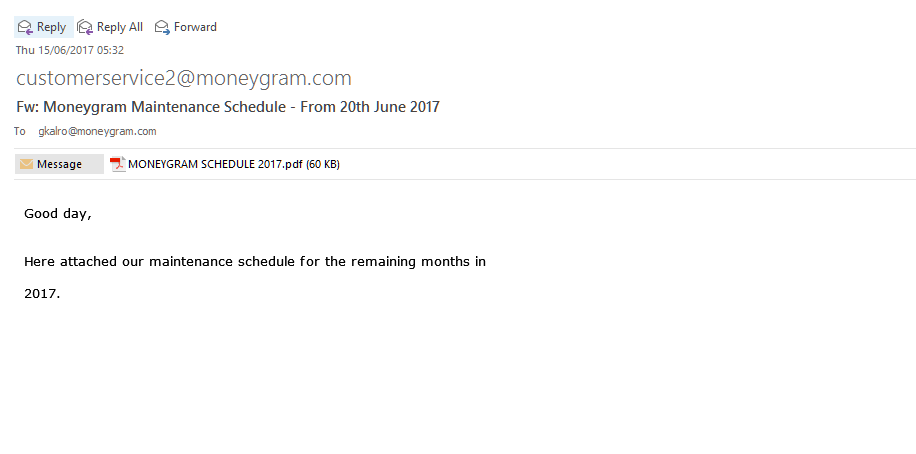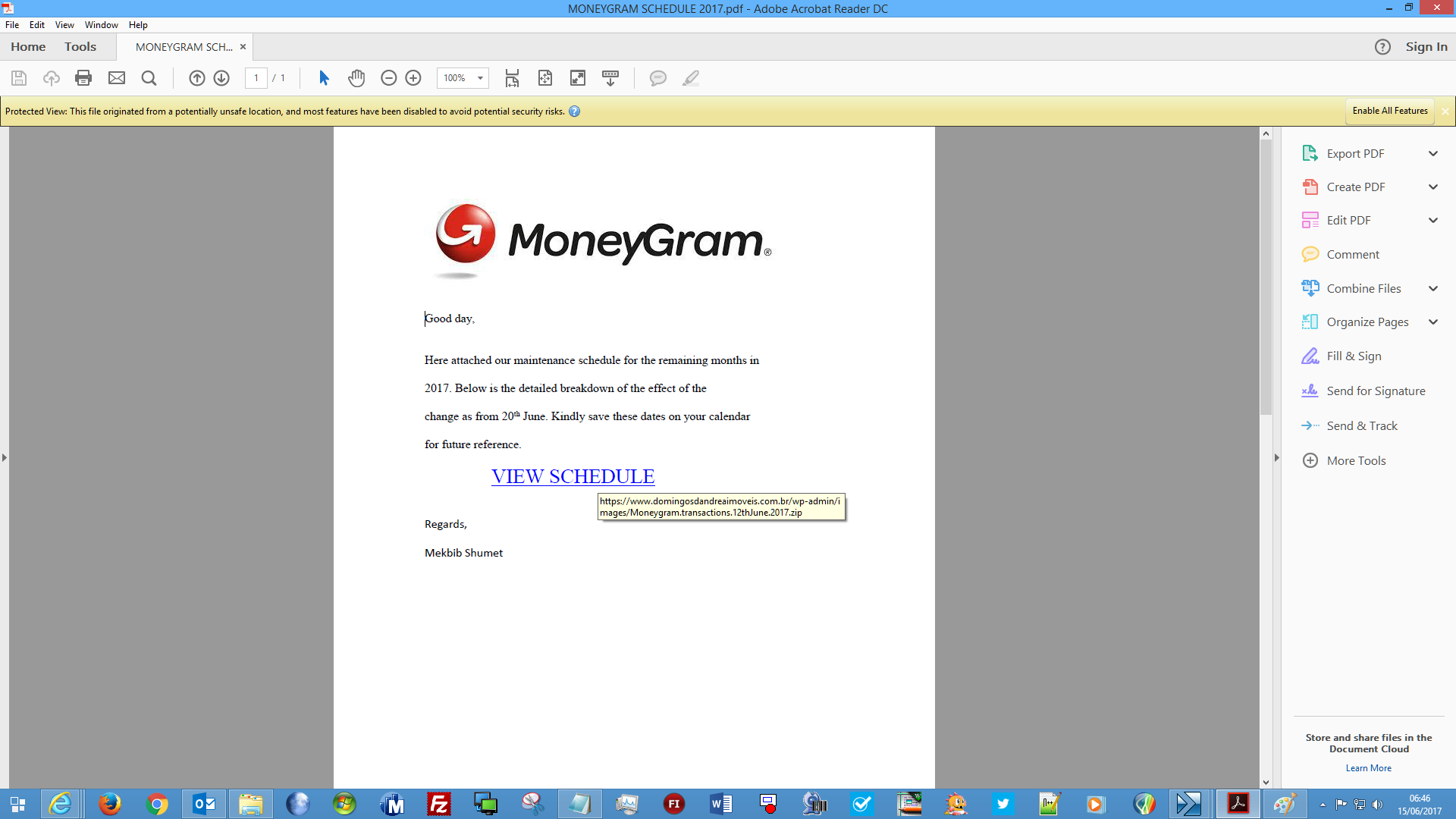We continue to be plagued by fake financial themed emails containing java adwind or Java Jacksbot attachments. I have previously mentioned many of these HERE. We have been seeing these sort of emails almost every day and there was nothing much to update. Today’s has a slightly different subject and email content to previous ones. Many Antiviruses on Virus Total detect these heuristically.
Today’s version is more devious than previous versions and comes via a spam protection service which is used by many ISPs and hosting companies as a spam filtering service. They obviously are not doing a very good job of filtering outbound mail.
While I cannot guarantee that the sender is using the siteground web hosting company listed in the headers, I do know that siteground does use this service, so there is a very high likelihood of that being genuine. It is extremely likely that the Siteground customer listed in the headers madprintsnc.com has been compromised and their account is being used to send this spam
These have a genuine PDF attachment with a link in it that downloads a zip containing the malware. The link goes to which is almost certainly a compromised wordpress site, rather than one set up by the criminals to spread this malware
Moneygram.transactions.12thJune.2017.jar (474kb) Current Virus total detections: Payload Security
Make Note: Java Adwind / Java Jacksbot are both very dangerous remote access backdoor Trojans, that have cross OS capabilities and can potentially run and infect any computer or operating system including windows, Apple Mac, Android and Linux. It however can only be active or infect you if you have Sun / Oracle Java installed. Along with most security professionals, I strongly urge you to uninstall java and not use it, unless you have a pressing need for it.
The majority of domestic ( home ) users and small businesses have no need for Java on their computers. This Article from a couple of years ago explains why you should remove it. If you cannot remove it then it must be kept up to date and be extremely careful with what you download or open.
They use email addresses and subjects that will entice a user to read the email and open the attachment. A very high proportion are being targeted at small and medium size businesses, with the hope of getting a better response than they do from consumers.
Remember many email clients, especially on a mobile phone or tablet, only show the Name in the From: and not the bit in <domain.com >. That is why these scams and phishes work so well.
None of the companies mentioned in the body of the email been hacked or had their email or other servers compromised. They are not sending the emails to you. They are just innocent victims in exactly the same way as every recipient of these emails.
The email looks like:
From: [email protected]
Date: Thu 15/06/2017 05:32
Subject: Fw: Moneygram Maintenance Schedule – From 20th June 2017
Attachment: MONEYGRAM SCHEDULE 2017.pdf
Body Content:
Good day,
Here attached our maintenance schedule for the remaining months in
2017.
 The pdf looks like
The pdf looks like

Email Headers:
| SpamAssassin Rules |
|
||||||||||||||||||||||||||||||
|---|---|---|---|---|---|---|---|---|---|---|---|---|---|---|---|---|---|---|---|---|---|---|---|---|---|---|---|---|---|---|---|
| Header IPs |
Received: from delivery.mailspamprotection.com ([184.154.48.172]:32897)
by knight.knighthosting.co.uk with esmtps (TLSv1.2:ECDHE-RSA-AES256-GCM-SHA384:256) (Exim 4.89) (envelope-from <[email protected]>) id 1dLMt6-0004Xk-Ld for [email protected]; Thu, 15 Jun 2017 06:00:09 +0100 Received: from ns1.es7.siteground.eu ([37.60.237.241] helo=es7.siteground.eu) by se5.mailspamprotection.com with esmtps (TLSv1.2:ECDHE-RSA-AES256-GCM-SHA384:256) (Exim 4.86) (envelope-from <[email protected]>) id 1dLMt0-0006zm-Aw for [email protected]; Thu, 15 Jun 2017 00:00:07 -0500 Received: from [127.0.0.1] (port=38040 helo=www.madprintsnc.com) by es7.siteground.eu with esmtpa (Exim 4.86_2) (envelope-from <[email protected]>) id 1dLMkr-000AtY-4H; Thu, 15 Jun 2017 06:51:37 +0200 MIME-Version: 1.0 Content-Type: multipart/mixed; boundary=”=_bf006d8770b5126151df4a6fe3a3df87″ Date: Thu, 15 Jun 2017 06:51:32 +0200 From: [email protected] To: [email protected] Subject: Fw: Moneygram Maintenance Schedule – From 20th June 2017 Message-ID: <[email protected]> X-Sender: [email protected] User-Agent: Roundcube Webmail/1.2.4 X-AntiAbuse: This header was added to track abuse, please include it with any abuse report X-AntiAbuse: Primary Hostname – es7.siteground.eu X-AntiAbuse: Original Domain – thespykiller.co.uk X-AntiAbuse: Originator/Caller UID/GID – [47 12] / [47 12] X-AntiAbuse: Sender Address Domain – moneygram.com X-Get-Message-Sender-Via: es7.siteground.eu: none X-Originating-IP: 37.60.237.241 X-SpamExperts-Domain: es7.siteground.eu X-SpamExperts-Username: 37.60.237.241 Authentication-Results: mailspamprotection.com; auth=pass [email protected] X-SpamExperts-Outgoing-Class: unsure X-SpamExperts-Outgoing-Evidence: Combined (0.43) X-Recommended-Action: accept X-Filter-ID: PqwsvolAWURa0gwxuN3S5YEa3T7JuZT23fGO2rGt3ZgCHAVYb1AjAOyHBFHEsPxlOgGdrYTuaQKX veVr7h1sgoeQq0DLsh5kQkLPdodwmRqoBhJtY5vTNvhAxKigHq4Ejbt9xMcu33DaXydIVlTDC4Al BhETjPFORYIxfudZYVjCc/Fn0Xh6lDnYdZ/zz3BcVXqK0CbXP8TlBsfb2T2d/r4Ey0GBN0sA88Oc ocN4eeNqc+h2W0z7PInERhAR5xqRlsgNmFPa1DuVf6R+MMFnTeLp54UWCNHw63X/7Z9UCIt3f7Eu fc/PhA/JTpuJYyXO31/E3ahF5MMcDI7KdpjQKdpOP4i8hbp8xprzdRaICTZli19mW0G91CSooRJq A7sIQblBBjnOZU9g4MVlhEUKfURodVF8/1fPDFr8guBYT5qDpdq3Q4knYBZuH/aTKbzgIX3lzMlp 1EI4zA+CSt1qtqnyblzldDAIulBqCWWthQNPui8l9tuEkh2T29+EFDAeOf354IcncBxB7uicIGwJ k1fRAiMiMKfXO9C5TEIHDgm3b5Loc623nnIIpLdBVf0QcBVCJonXsjXxy5d4FiHM6IOl2rdDiSdg Fm4f9pMpvOC57IUNtZsmYlZe2TrEPH/IhqwTdeSsVSFJOF7cGZtsaL4gmQs2N6/VVWxk4hAASd5R aLZ9UxrKURlnx45mq7jtG16ZHr2hJU4vrAlsJqsR4vgVB1xo6dCfBaU/iegBU8aIXMiE91D0NVEp KrcSWlMLNO/CNMvt7kuHTSolIGEwVERVFYk8y65OAKwyoHuRH4rfjbnzCEaPAT12tkwI49nmnu04 5onhipdPBQJuTs6mMMaTp9W3zJ1sP7/AXa/BXAWxqi6Bm8tLvb5mqDtmkdpqRxpIxa/M6mQJvjnI IFdsMompekbj7M3pXEwGNKCQ5UX20UB+sFJeMz3bO+SVbFl6 X-Report-Abuse-To: [email protected] Note: Only the final IP address outside of your network in the Received: fields can be trusted as others can be spoofed
|
||||||||||||||||||||||||||||||
These malicious attachments have a password stealing component, with the aim of stealing your bank, PayPal or other financial details along with your email or FTP ( web space) log in credentials. Many of them are also designed to specifically steal your Facebook and other social network log in details.
All the alleged senders, amounts, reference numbers, Bank codes, companies, names of employees, employee positions, email addresses and phone numbers mentioned in the emails are all random. Some of these companies will exist and some won’t.
Don’t try to respond by phone or email, all you will do is end up with an innocent person or company who have had their details spoofed and picked at random from a long list that the bad guys have previously found. The bad guys choose companies, Government departments and organisations with subjects that are designed to entice you or alarm you into blindly opening the attachment or clicking the link in the email to see what is happening.
Please read our How to protect yourselves page for simple, sensible advice on how to avoid being infected by this sort of socially engineered malware.
12 October 2016 : details.jar (119kb) Current Virus total detections: Payload Security
This is another one of the files that unless you have “show known file extensions enabled“, can easily be mistaken for a genuine DOC / PDF / JPG or other common file instead of the .EXE / .JS file it really is, so making it much more likely for you to accidentally open it and be infected.
Be very careful with email attachments. All of these emails use Social engineering tricks to persuade you to open the attachments that come with the email. Whether it is a message saying “look at this picture of me I took last night” and it appears to come from a friend or is more targeted at somebody who regularly is likely to receive PDF attachments or Word .doc attachments or any other common file that you use every day.
The basic rule is NEVER open any attachment to an email, unless you are expecting it. Now that is very easy to say but quite hard to put into practice, because we all get emails with files attached to them. Our friends and family love to send us pictures of them doing silly things, or even cute pictures of the children or pets.
Never just blindly click on the file in your email program. Always save the file to your downloads folder, so you can check it first. Many malicious files that are attached to emails will have a faked extension. That is the 3 letters at the end of the file name. Unfortunately windows by default hides the file extensions so you need to Set your folder options to “show known file types.
Then when you unzip the zip file that is supposed to contain the pictures of “Sally’s dog catching a ball” or a report in word document format that work has supposedly sent you to finish working on at the weekend, or an invoice or order confirmation from some company, you can easily see if it is a picture or document & not a malicious program.
If you see .JS or .EXE or .COM or .PIF or .SCR or .HTA at the end of the file name DO NOT click on it or try to open it, it will infect you.
While the malicious program is inside the zip file, it cannot harm you or automatically run. When it is just sitting unzipped in your downloads folder it won’t infect you, provided you don’t click it to run it. Just delete the zip and any extracted file and everything will be OK. You can always run a scan with your antivirus to be sure.
There are some zip files that can be configured by the bad guys to automatically run the malware file when you double click the zip to extract the file. If you right click any suspicious zip file received, and select extract here or extract to folder ( after saving the zip to a folder on the computer) that risk is virtually eliminated. Never attempt to open a zip directly from your email, that is a guaranteed way to get infected. The best way is to just delete the unexpected zip and not risk any infection.
